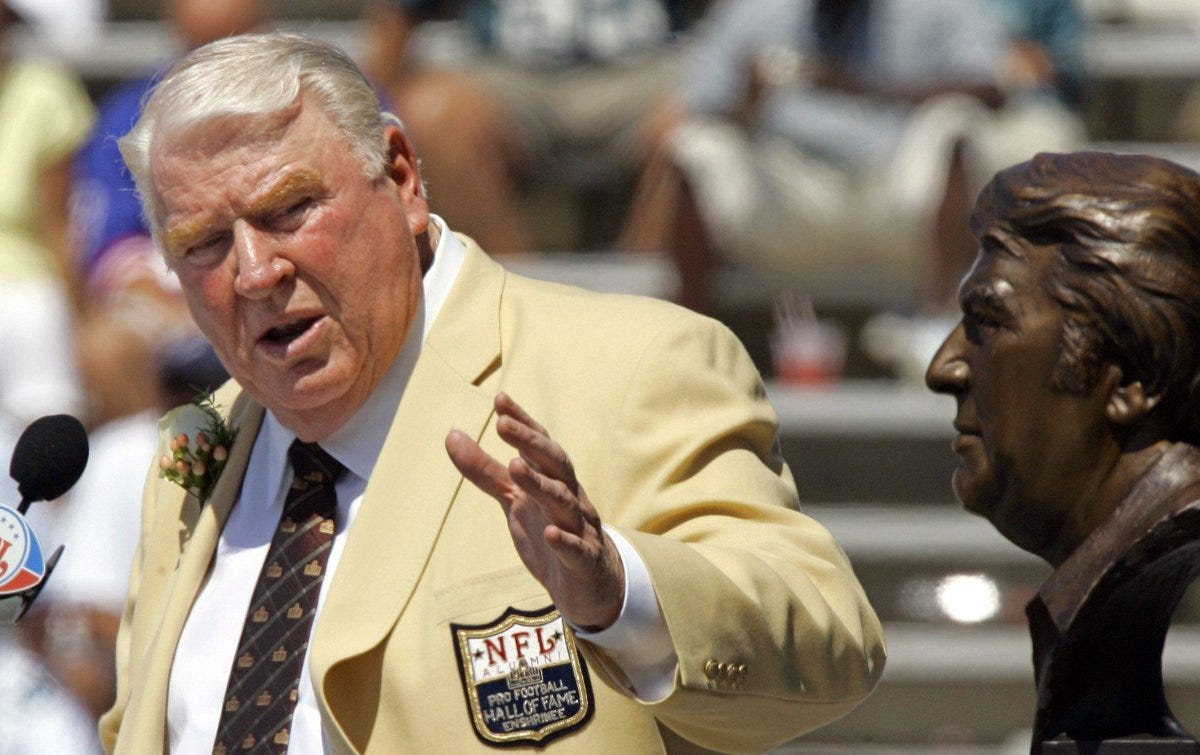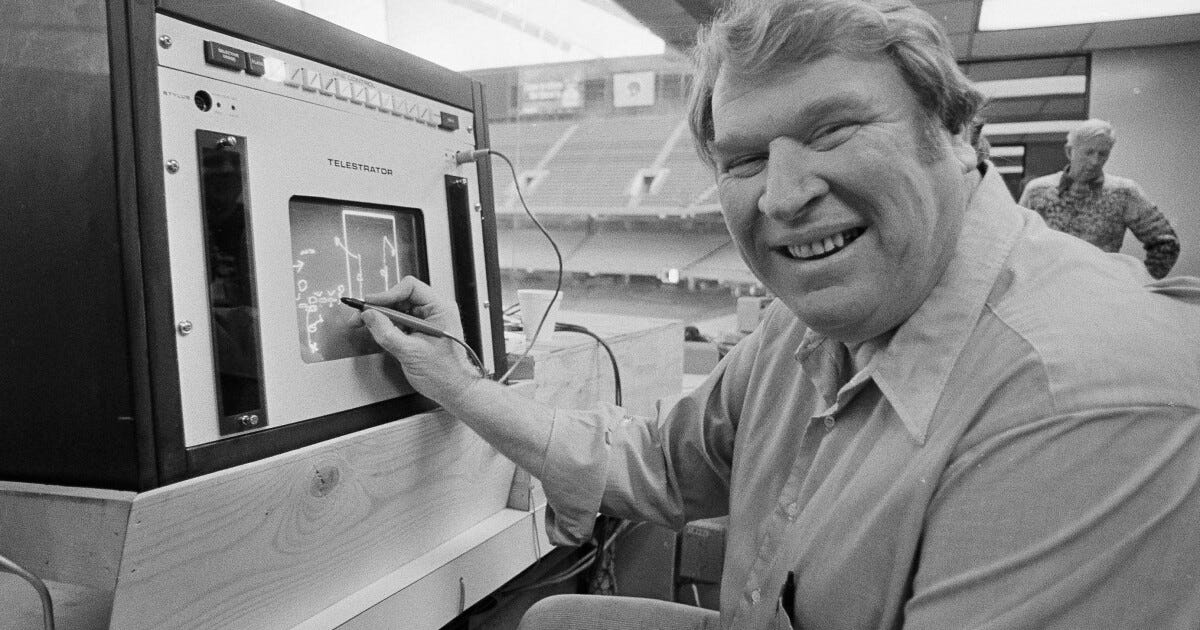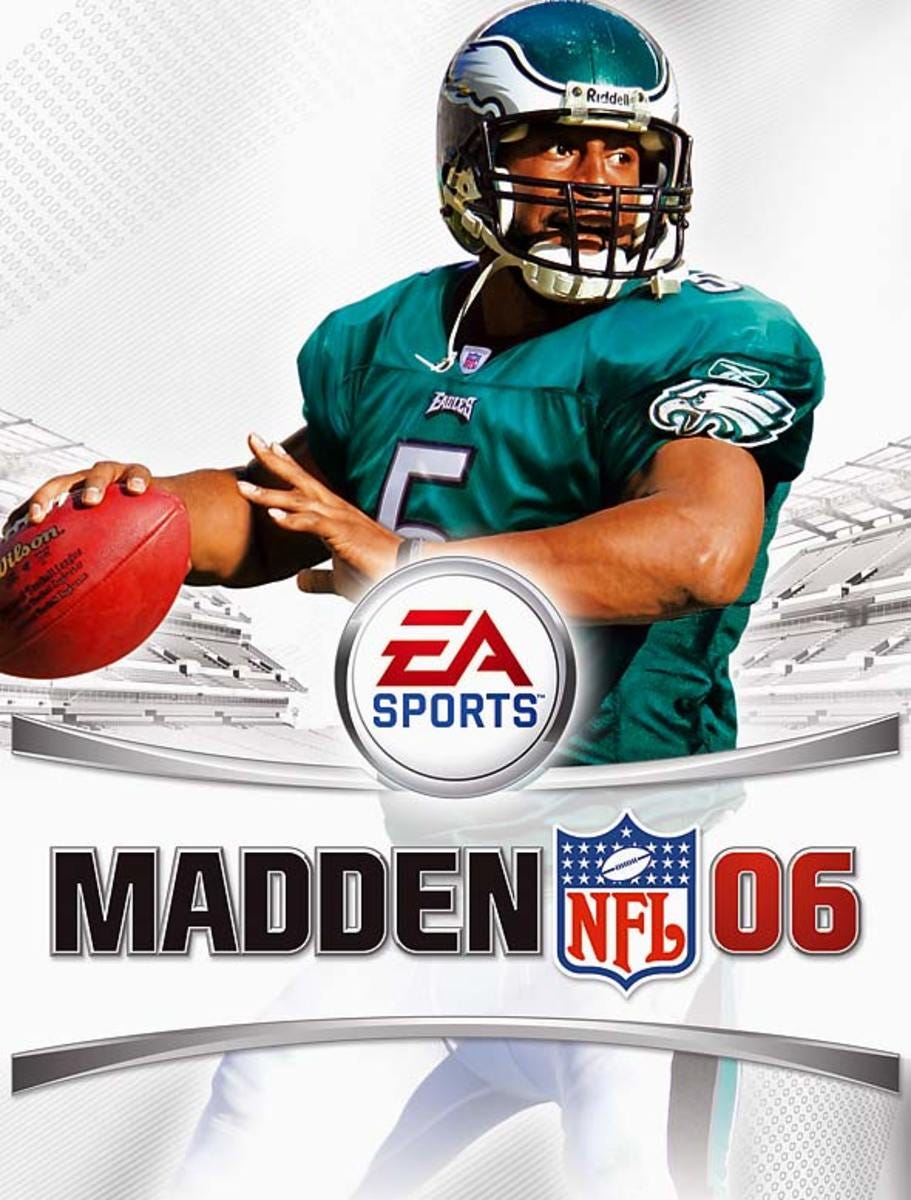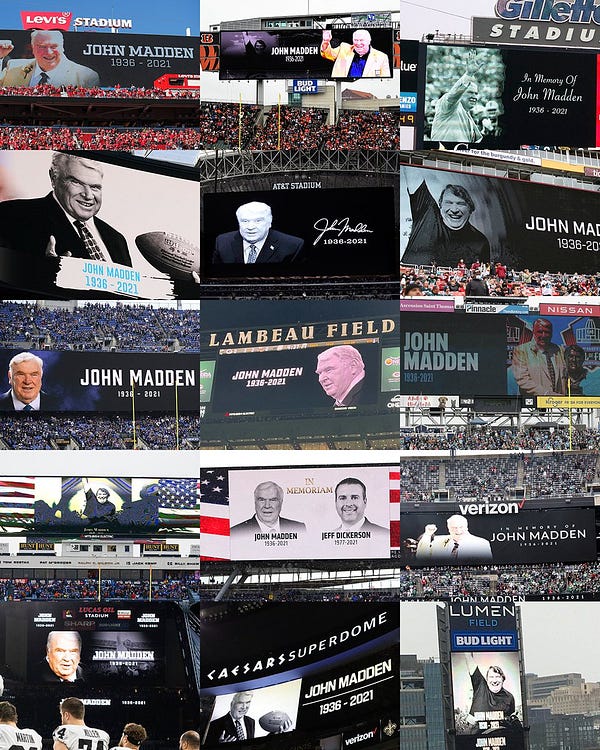Thank you, John Madden
Every Monday morning, I write an email newsletter discussing the business and stories behind sports and entertainment. If you would like to receive it directly in your inbox, subscribe now for free.
Hey Team,
Thanks for tuning in to The Fast Break.
If this is your first time, welcome! If not, thanks for coming back.
If you haven’t before, can you do me a 5-second favour? Please reply to this email saying “Yes”?
Doing so will ensure my newsletter ends up appropriately in your inbox instead of the spam folder :)
Executive Brief: Today’s newsletter discusses John Madden’s legendary professional football career and his impact on the game during his time on Earth. Whether it was his time as a coach, broadcaster or industry mover, John Madden was a revolutionary of the sport.
John Madden Passes Away at 85
The famed NFL coach and sports industry legend John Madden passed away on December 28th; he was 85-years-old. Madden was revolutionary many times over, changing the game of football for multiple generations. After a short-lived playing career, Madden became a 32-year-old football coaching savant. Then, he became an electrifying TV broadcaster. Then, numerous generations learned his name solely because of his role with the football video game Madden NFL Football, created by Electronic Arts (EA). Madden licensed his name, image, insights, and creative outlook to EA over the many years of business together.
Madden leaves behind a substantial fortune and net worth generated from his roles in football over the years. It’s estimated that his net worth is approximately USD $200 million at the date of his passing, though precise metrics are not available. Most of this wealth came from his deals with EA Sports and his role with the Madden NFL Football video game.
Madden’s Historic Career
John Madden, The Coach
For older football fans, Madden is known as the head coach of the Oakland Raiders, with whom he won seven titles and one Super Bowl in 1976. Soon after an injury ended his playing career before it started, Madden became the youngest ever professional football head coach when the Raiders hired him at 32. Originally hired by Al Davis as a linebackers coach for the AFL’s Oakland Raiders in 1967, the rest was history. Madden became head coach of the Raiders in 1969 and continued there until 1978. His teams made the playoffs almost every year he coached and won Super Bowl XI.
John Madden, the TV Broadcaster
Immediately after retiring from coaching in January 1979, Madden took his talents to broadcast TV. Over the years, he became a legend of the industry. Madden served at the following networks:
CBS Sports from 1979 to 1993
He and Pat Summerall called eight Super Bowls together for CBS.
Fox Sports from 1994 to 2001
While at Fox Sports, Rupert Murdoch’s company paid Madden more annually than any NFL player made at the time.
Near the end of his contract, Madden made almost $8 million per year. Fox ultimately had to terminate its NFL-related contracts due to financial issues at the time.
ABC Sports from 2002 to 2005
In 2002, Madden joined ABC’s Monday Night Football working alongside Al Michaels, which paid him approximately $5 million per year.
NBC Sports from 2006 to 2008
In 2006, Madden became the first broadcaster to work for all the “Big Four” US broadcast television networks when he started his role calling NBC’s Sunday Night Football games.
On February 1, 2009, he called his final game for Super Bowl XLIII between the Arizona Cardinals and Pittsburgh Steelers.
Madden was a football savant. On TV, he never talked down to his audience. He understood that football was a complex sport often described through complicated lingo. Madden cut through the noise and confusion and made the game sound like backyard fun. Madden won critical acclaim and fourteen Sports Emmy Awards for Outstanding Sports Event Analyst during his broadcasting career. He was renowned for making professional football accessible for the average fan, commonly using famous interjections like “Boom!”, “Whap!”, “Bang!” and “Doink!”. Check out this video for highlights of his best announcing moments:
His favourite method of interacting with the fans was using the telestrator. The telestrator is the device that allows broadcasters to superimpose light-penned diagrams of football plays over video footage. Madden’s use of the technology popularized it to the point that it became a staple of all sports coverage.
Madden was always gently selling the game – the playmaking, the atmosphere, the stars, the coaches, and the other beautiful parts of the game. His talent was storytelling and making household names out of players, no matter the position. He used his talents for doing so to create the “All-Madden Teams”. His All-Madden Teams were released often and included tough hardnosed players who carried the proverbial lunch pail to work each day. These players were much like Madden who built a ridiculous 476-weekend streak of consecutive broadcast appearances during his career.
The craziest part of this record? Madden didn’t fly. After losing people close to him during a plane crash in the early 1960’s, Madden continued to fly periodically for work. Then, in 1979 he dealt with panic attacks and never flew on a plane again due to bouts with claustrophobia. Instead, he took the train and eventually a custom bus.
During his career, Madden was also the face of multiple brands through advertising and cameo deals, including:
Ace Hardware
Outback Steakhouse
Verizon Wireless
Miller Lite
Toyota
Sirius Satellite Radio
McDonald’s
After his career, he was inducted into multiple Hall of Fames including:
Bay Area Sports Hall of Fame (class of 1991)
Pro Football Hall of Fame (class of 2006)
California Hall of Fame (class of 2009)
2010 NSMA Hall of Fame inductee
Madden NFL Football
For many newer-generation NFL fans, John Madden’s biggest contribution was licensing his name, voice, and creative input to EA Sports’ John Madden Football series which later became Madden NFL Football. After EA CEO Trip Hawkins’ first two choices, Joe Montana and Joe Kapp, fell through due to contractual issues and royalty negotiations, Madden was approached to become the face of the video game — he eventually agreed.
Madden viewed the video game as an educational tool that taught users the game of football via video game format. Madden originally envisioned the game as a tool for teaching and testing plays, and it ultimately became a way for people to learn the game and participate in it to a sophisticated level. The original playbooks for Madden NFL came from John Madden too. He originally sent them a 1980 Oakland Raiders playbook to use and implement. The developers would later approach assistant coaches from other teams to retain top plays to use in the playbooks.
Madden’s major contribution to the game was ensuring it was “real” pro football. In a January 2012 interview with Grantland, Madden told Tom Bissel, “If it wasn’t real football, I didn’t want my name on it.” And that, “I wanted it to be real football – pro football – with the sideline, the numbers, the hash marks. Everything had to be pro football.”
EA released the first iteration of the game in 1984, but Madden did not sign-on until 1988 when EA agreed to make the game as real as possible. EA has released annual versions since 1990 and had the series’ name changed to Madden NFL in 1993 after EA acquired the rights to use NFL teams and players. The video game’s original iterations were released on Apple computers. Several years later, it made its first appearance on home gaming consoles.
After the game was released, EA CEO Trip Hawkins informed John Madden that EA was going to have an initial public offering that Madden could “have as much stock” as he wanted, though he would have to pay the initial price per share of $7.50. Madden declined at the time, not knowing much about computers or business. 10 years later in 1999, the share price rose to $70 per share, according to ESPN. Madden is quoted as saying, “That was the dumbest thing I ever did in my life.”
Over the following decades, EA became the leading sports video game development company behind its Madden NFL franchise along with its games focusing on other professional sports. EA reports that it has sold more than 130 million units of the game, amassing more than $4 billion in revenues by 2013. The game has now appeared on more than 30 platforms. Barron’s estimates that Madden NFL now generates around $600 million annually for EA.
Despite Madden’s earlier financial blunder, he and EA made things right in 2005 when they agreed to a reported $150-million deal allowing EA to use Madden’s name, image, and likeness rights in perpetuity, along with Madden receiving annual royalties as a part of the agreement. It’s estimated that he earned approximately $2 million per year for his involvement between 2005 to 2009.
In the spring of 2020, EA agreed to terms with the NFL and NFLPA on a new licensing agreement allowing the game to use the league and its players’ name, image and likeness for the game. The deal was estimated to be worth at least $1 billion for the league and $500 million for the players.
Final Thoughts
Many folks will remember John Madden for his role that hits closest to home for them. For my generation, it will be Madden NFL Football. I can’t begin to think how often the term was used in our lexicon growing up as young sports fans.
Madden approached his roles with art and enthusiasm that few others can reproduce, and I’ll forever remember him for that.
If there’s anything you take away from his story, I challenge you to consider his enthusiasm, love of the game and work, care for the details, and focus on self-education as he approached every role he took. If we all did the same, who knows where we can go.
Thank you for reading. Have a great day, and we’ll talk next week!
Please subscribe, share with friends, and follow me on social media if you like this newsletter. You can also drop a comment for me below to let me know your thoughts.
Kendal
Question of the Day
What is your favourite John Madden or EA Madden Football memory?
Games of the Week
NBA
Mon, January 3rd: Miami Heat @ Golden State Warriors at 10:00 p.m. (ET.)
Fri, January 7th: Milwaukee Bucks @ Brooklyn Nets at 7:30 p.m. (ET.)
NHL
Wed, January 5th: Edmonton Oilers @ Toronto Maple Leafs at 7:00 p.m. (ET.)
Thurs, January 6th: Calgary Flames @ Tampa Bay Lightning at 7:00 p.m. (ET.)
NFL
Sun, January 9th: Dallas Cowboys @ Philadelphia Eagles at 1:00 p.m. (ET.)
Sun, January 9th: San Francisco 49ers @ Los Angeles Rams at 4:25 p.m. (ET.)










